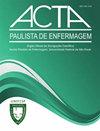Empowering behavior of the nurse-leader from the perspective of nursing technicians and assistants
IF 1
4区 医学
Q3 NURSING
引用次数: 0
Abstract
Objective Associate demographic and work data and the empowering behavior of the nurse-leader from the perspective of nursing technicians and assistants. Methods Cross-sectional and correlational research carried out in a tertiary university hospital in the state of São Paulo. A total of 260 mid-level nursing professionals (nursing technicians and assistants) participated, using self-administered instruments from May to August 2021. To verify the association between the scale classes and the explanatory variables, a chi-square or Fisher’s exact test was performed in the SAS program. Relationships were statistically significant if p<0.05. Results The profile of the participants was predominantly female, mean age 41.9 years, daytime workers, workload of 36.7 hours and satisfied with their work. The application of the Leader’s Empowering Behavior instrument showed that the domain with the highest average of empowering behavior was “meaningful work” and the one with the lowest average was “autonomy in relation to bureaucracy”. Nursing assistants and technicians who worked during the day did not have other work relationships and were satisfied with it, in addition to observing the leader’s empowering behavior more. Conclusion Nurses’ behavior to empower their team, from the perspective of technicians and nursing assistants in the studied hospital, was good in most domains, except in the domain “autonomy from bureaucracy”, where it was reasonable. Working the day shift, not having other jobs and being satisfied with the job were aspects of greater empowerment.从护理技术员和助理的角度看护士长的授权行为
目的从护理技师和护理助理的角度出发,将人口统计和工作数据与护士长的授权行为联系起来。方法在圣保罗州某大学附属医院进行横断面及相关研究。从2021年5月至8月,共有260名中级护理专业人员(护理技术员和助理)参与,使用自我管理的仪器。为了验证量表类别与解释变量之间的关联,在SAS程序中进行卡方检验或Fisher精确检验。p < 0.05,相关性有统计学意义。结果调查对象以女性为主,平均年龄41.9岁,白天工作,工作时间36.7小时,对工作满意。领导者授权行为量表的应用表明,授权行为平均最高的领域是“有意义的工作”,平均最低的领域是“与官僚主义相关的自治”。白天工作的护理助理和技术人员除了更多地观察领导的授权行为外,没有其他工作关系,并且对其感到满意。结论从所研究医院的技术人员和护理员的角度来看,护士的团队授权行为在大多数领域都是好的,除了“从官僚主义自治”领域,这是合理的。上白班,没有其他工作,对工作感到满意是更大的授权。
本文章由计算机程序翻译,如有差异,请以英文原文为准。
求助全文
约1分钟内获得全文
求助全文
来源期刊

Acta Paulista De Enfermagem
NURSING-
CiteScore
1.40
自引率
0.00%
发文量
92
审稿时长
4 weeks
期刊介绍:
Acta Paulista de Enfermagem – (Acta Paul Enferm.), ISSN 1982-0194, is a [bilingual] technical-scientific electronic publication of the Escola Paulista de Enfermagem – EPE, Universidade Federal de São Paulo – UNIFESP.
Our mission: To disseminate the scientific knowledge generated within the rigor of research and ethics methodology.
Our objective: To publish results of original research for advancement of practices of clinical, surgical, and management nursing, as well as education, research, and information and communication technology.
 求助内容:
求助内容: 应助结果提醒方式:
应助结果提醒方式:


